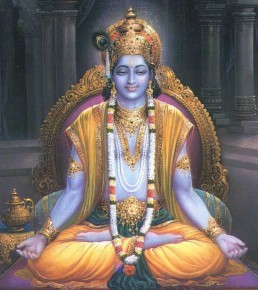Commentary
The question how does such a person, purified through Sattvic Tyaga, gains the highest spiritual experience is answered here.
A man of Sattvic relinquishment never hates any disagreeable work and environment nor gets attached to any agreeable fields of action and favorable scheme of things. He does his duties under all circumstances, agreeable or disagreeable, without getting elated when successful or dejected when faced with obstacles.
He is not overwhelmed by joy or sorrow; he is always equanimous. He is independent of the happenings around him. Even the low impulses like jealousy, anger, passion, greed etc. do not influence him. He does not become a victim of his own mental impressions, Vasanas.
Such a man is considered to be pervaded by purity. He is said to be educated, cultured and with clear vision of his goal without getting hampered by all sorts of doubts. He is termed a man of understanding, a Medhavi.
He knows his field of activity and his own divine nature. He is fully aware of the instruments of action and his relationship with the world outside. But a majority of people identify themselves with doership and live in the world conditioned by the happenings around. Such an average man who works with an ego and attachment must learn to work at least renouncing the fruits of his action which is explained in the next verse.
Swami Chinmayananda
Swami Chinmayananda Commentary
The commentary on this verse and the rest, is avaialble for free as:
Kindle eBook
Google Play Book
Apple Books
Adi Sankara Commentary
Na devesti, he does not hate; akusalam, unbefitting; karma, action, rites and duties meant for desired results-with the idea, ‘What is the usefulness of this which is a cause of transmigration through fresh embodiment?’ Na anusajjate, he does not become attached to; kusale, befitting activity, daily obligatory duties, by thinking that this is the cause of Liberation by virtue of its being the cause of purification of the mind, rise of Knowledge and steadfastness in it. That is to say, he does not entertain any liking even for it, because he finds no purpose in it. Who, again, is he? Tyagi, the man of renunciation, who has become so by having given up attachment and rewards of action in the manner stated above. He is a tyagi who performs nityakarmas by relinquishing attachment to those acts and (their) results. Again, it is being stated as to when that person does not hate an unbefitting act and does not become attached to a befitting activity: When he has become sattva-samavistah, imbued with sattva, i. e., when he is filled with, possessed of, sattva, which is the means to the knowledge that discriminates between the Self and the not-Self; and hence medhavi, wise-endowed with intelligence (medha), intuitive experience, characterized as knowledge of the Self; one possessed of that is medhavai (wise)-; and owing to the very fact of being wise, chinnasamsayah, freed from doubts-one whose doubts created by ignorance have been sundered, one who is freed from doubts by his firm conviction that nothing but abiding in the ture nature of the Self is the supreme means to the highest Good. The person competent (for rites and duties) who, having gradually become purified in mind through the practice of Karma-yoga in the way described above, has realized as his own Self the actionless Self, which is devoid of modifications like birth etc., he, ‘… having given up all actions mentally, remaining at without doing or causing (others) to do anything at all’ (cf. 5.13), attains steadfastness in Knowledge, which is characterized as ‘actionless- ness’. In this way, the purpose of the aforesaid Karma-yoga has been stated through the present verse. On the other hand, since, for the unenlightened person-who, while being qualified (for rites and duties), holds on to the body owing to the erroneous conception that the body is the Self, and who has the firm conviction, ‘I am the agent,’ because of the persistence of his idea that the Self is the agent-it is not possible to renounce actions totally, therefore he has competence only for performing enjoined duties by giving up fruits of actions. But he is not to renounce them (actions). In order to point out this idea the Lord says:
The Bhagavad Gita with the commentary of Sri Sankaracharya – Translated by Alladi Mahadeva Sastry
Holy Geeta – Commentary by Swami Chinmayananda
The Bhagavad Gita by Eknath Easwaran – Best selling translation of the Bhagavad Gita
The Bhagavad Gita – Translation and Commentary by Swami Sivananda
Bhagavad Gita – Translation and Commentary by Bhaktivedanta Swami Prabupadha
Srimad Bhagavad Gita Chapter 18 – Verse 10 – 18.10 na dvestyakusalam – All Bhagavad Gita (Geeta) Verses in Sanskrit, English, Transliteration, Word Meaning, Translation, Audio, Shankara Bhashya, Adi Sankaracharya Commentary and Links to Videos by Swami Chinmayananda and others – 18-10

